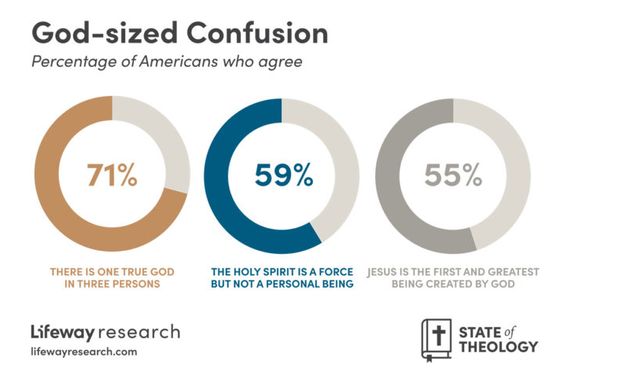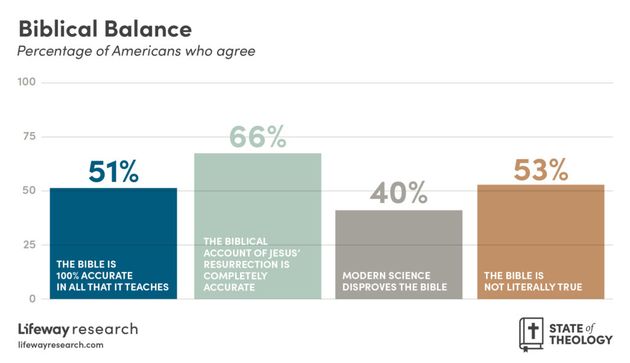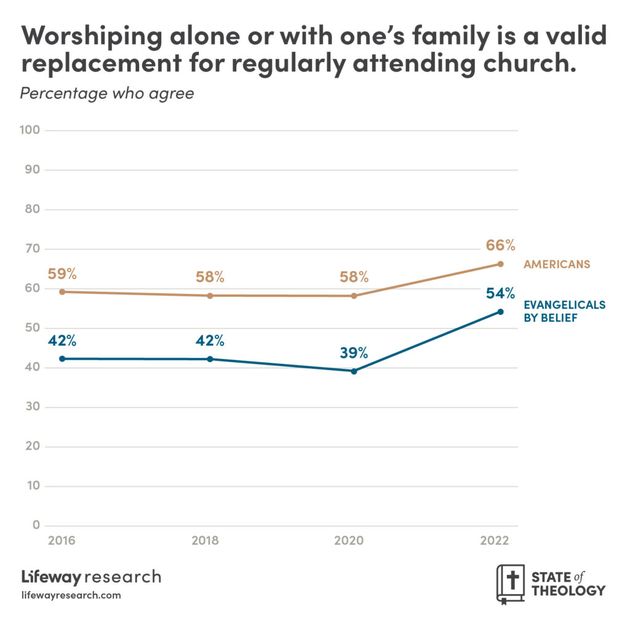The recently released State of Theology survey states that “Americans often aren’t sure how to balance hot-button cultural issues with theological beliefs”.
![A building in downtown Los Angeles, USA. / Photo: [link]Hester Qiang[/link], Unsplash, CC0](https://cms.evangelicalfocus.com/upload/imagenes/6332bc88ca0bd_hesterqiang940.jpg) A building in downtown Los Angeles, USA. / Photo: [link]Hester Qiang[/link], Unsplash, CC0
A building in downtown Los Angeles, USA. / Photo: [link]Hester Qiang[/link], Unsplash, CC0
LifeWay Research has recently released the biennial State of Theology study, sponsored by Ligonier Ministries, which aims to “measure the current theological awareness of adult Americans”.
Researchers carried out 3,011 interviews between January 5-23, 2022, seeking to “help Christians better understand today’s culture and to equip the church with better insights for discipleship”.
“With many theological beliefs remaining stable, those that did shift point to areas where a changing U.S. culture may be impacting Americans’ religious perspectives”, they say.
The study focuses on six key doctrinal areas: God; goodness and sin; salvation and religious texts; judgement and punishment; the church; and social issues.
The study shows that 71% agree there is one true God in three persons, and about two-thirds (66%) believe God cannot make a mistake, but half believe God is less than all-knowing, having to learn and adapt.
There is still confusion about the Jesus and the Holy Spirit , as in the previous survey, with 53% stating that Jesus was a great teacher but not God, 55% that He is the first and greatest created being, and 59% that the Holy Spirit is a force but not a personal being.

Most respondents (71%) point out that everyone is born innocent in the eyes of God, and 66% agree that everyone sins a little, but most people are good by nature.
Furthermore, a quarter of those surveyed say that even the smallest sin deserves eternal damnation, while 57% agree “God counts a person as righteous not because of one’s works but only because of one’s faith in Jesus Christ”.
Half of Americans believe the Bible is completely accurate, but they increasingly reject its accuracy, with almost the same number (53%) saying it is not literally true. Moreover, 40% agree modern science disproves it.
“As a society, views on the Bible probably best summarize how split Americans are when it comes to theology. Higher numbers acknowledge the story it tells, but more than half also give weight to their personal opinions”, explains Scott McConnell, executive director of Lifeway Research.

[photo_footer] LifeWay Research [/photo_footer]
Regarding salvation, the study shows that for 60% of the respondents “only those who trust in Jesus Christ alone as their Saviour receive God’s free gift of eternal salvation”, but just 30% say God chose the people he would save before he created the world.
Around a third of Americans (32%) believe God isn’t concerned with what they do on a daily basis, up from 25% in 2020 and the highest since the State of Theology first asked this question in 2014.
However, 64% agree that there will be a time when Jesus Christ returns to judge all the people who have lived. 59% of Americans say “hell is a real place where certain people will be punished forever.” This is higher than 2020 (56%) and 2018 (54%).
After months of quarantines and social distancing, Americans increasingly (66%) believe worshipping apart from a church is as good as attending church services.
Most of them (67%) also agree that God accepts the worship of all religions, including Christianity, Judaism and Islam.

[photo_footer] LifeWay Research [/photo_footer]
According to McConnell, “religious identity, beliefs and behaviour are interrelated. When in-person church attendance behaviours were interrupted and habits were broken, it affected some Americans’ beliefs about the need to gather with other believers to worship”.
As in previous years, this part of the study also assesses the opinion of respondents on the participation of Christians in politics. In 2022, 30% agree that Christians should be silent on issues of politics. This is higher than 2020 (24%) and 2018 (25%).
The authors of the survey underline that “hot-button cultural issues often intersect with theological beliefs, and Americans often aren’t sure how to balance the two”.
Six in 10 Americans say religious belief is about opinion rather than objective truth, and 52% agree the Bible has the authority to tell us what we must do. That leads to Americans closely divided over several current hot topic issues such as abortion or gender identity.
Over half of the respondents (53%) state that both abortion and sex outside of marriage is a sin, while 42% agree gender identity is a matter of choice. This is higher than 2020 (38%).
“These results convey the ongoing need for the church to be engaged in apologetics, helping unbelievers by providing a well-reasoned defense of the Christian faith, and helping believers by strengthening their clarity and conviction regarding why they believe what they do”, stress the researchers.
You can see the full study here.

Las opiniones vertidas por nuestros colaboradores se realizan a nivel personal, pudiendo coincidir o no con la postura de la dirección de Protestante Digital.
Si quieres comentar o